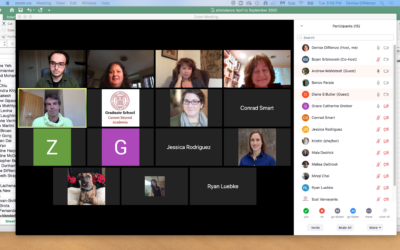Six Takeaways from Careers In.. Development and Alumni Affairs

Careers in Development and Alumni Relations panel discussion
Cornell alumni Diane Butler (PhD’04 Art History) and Banoo Parpia (PhD’95 Nutritional Science) joined Andrew Mahlstedt (PhD in English from the University of Wisconsin-Madison) to speak with graduate students and postdocs in the humanities, social sciences, and STEM fields about careers in development, with a special focus on entering the field. Here are some key takeaways from the discussion hosted by Careers Beyond Academia and moderated by Advisory Board Member Bojan Srbinovski.
1. How to get started: As a general rule, hiring in development happens through the networks that people cultivate over the years. The panelists advised participants, for instance, to get in touch with a professor from their alma mater and ask if they know anyone in the development office.
2. Extroversion is not required: There is a misconception that, to succeed in fundraising you need to be an extrovert. In fact, while social intelligence and EQ are essential, there are jobs in the field that are more data-driven, leaving room for the more reserved person. Intellectual engagement and understanding donor needs are far more important.
3. Blind emails may work: Potential employers in the field of fundraising occasionally like receiving blind emails – that is, if the potential job applicant has a specific idea for a need that they know how to address. Connect your passions and expertise to their organization.
4. Cultural humility: The importance of cultural competence cannot be overstated, especially in the context of international development. A successful development officer will find ways to fit into the environment of the different cultures where they go fundraise, in order to put their donors at ease.
5. The three A’s: The panelists advised that, in assessing the potential of a given donor, successful fundraisers will think of the three A’s: affinity (how interested the donor might be in supporting a certain cause), ability (how much the donor is capable of giving), and access (whether and how the fundraiser can enter the donor’s network).
6. Raise funds for what you care about: The most effective work in development happens when you care about the cause for which you are fundraising. Unless you have a commitment to the institution or project for which you are working, you will have a hard time convincing prospective donors to support it. A great fundraiser has the ability to marry knowledge with inspiration and can concisely tell an impactful story.
To set the stage for success in fundraising roles, the panelists urged graduate students and postdocs to make as many connections as possible across and outside the university now. If one treats meeting people as research to learn about their interests and passions, it may lead to more meetings in their professional network. Building relationships is key.
Skill check for careers in development and alumni affairs:
Listening, social intelligence, communication (concisely written and spoken, across broad audiences, in different forms like grants and reports), cultural competency, good judgement and an ability to build relationships.


